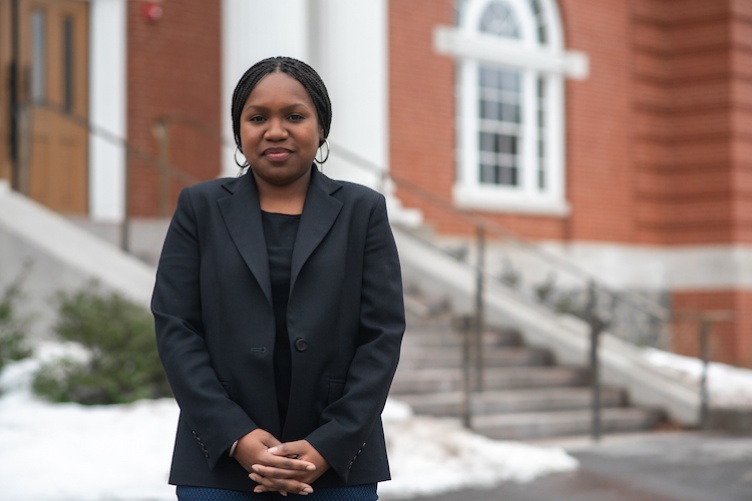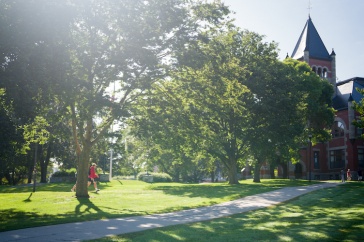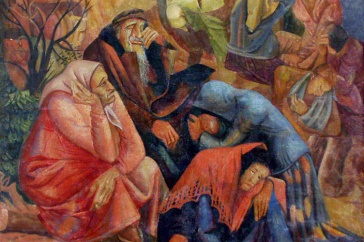
Kabria Baumgartner, assistant professor, English, women's and gender studies
"I was born and raised in Los Angeles, California. I spent 20 years of my life there and never traveled out of the state. There was no need, or so I thought—it’s a big state. You can get everything there: the ocean, the mountains, cities, great weather. I went to UCLA (University of California, Los Angeles ) for my bachelor’s and master’s degrees. I was living there, going to school; it was my world.
My degrees are in English and African American studies. Once I finished my master’s, I realized I didn’t want to commit to a Ph.D. in English just yet; I wanted to pursue African American studies, but I wasn’t sure where. There are a limited number of programs across the country.
I met my future husband at UCLA. He’s from Germany and was completing a study abroad program at UCLA. It was a total coincidence that a year earlier I had taken a German literature-in-translation class. We were reading about German philosophers, and the professor asked how many of us had traveled outside the United States. Three or four students raised their hands. To the rest of us he said, “What are you waiting for?”
My parents didn’t travel much, so I wasn’t bitten by the travel bug. Finishing college was my goal, and I didn’t think much about what other experiences college could offer outside of the classroom. I had a laser-like focus, which was good on one hand and limiting on the other hand. And then fortuitously, the following year I got the chance to travel as my relationship with my then-boyfriend, now-husband continued.
The immigration process—moving to Germany—was so simple. I had a 90-day visa and when I asked if I could stay to study the German language, I was given a year-long visa.
We lived in Berlin for two years, and it was amazing. Oh, I felt homesick at first, but soon I found my way and it was a fantastic experience. I learned more about myself as an African American woman. People I met in Germany assumed I was Nigerian— there is a fairly high population of West Africans there. I hadn’t ever thought about my diasporic self.
I was in Berlin during the (President George W.) Bush years. There were a lot of questions about America, Bush, and the Iraq War. I was at Humboldt University, taking classes toward a second master’s degree, so not only was I in Germany but I was at a German university. I found myself feeling like I had to defend my country.
Moving to Berlin was one of the best things I have ever done. I traveled to London, Rome, Budapest, and Paris. I got married in Denmark. I was able to see so much of the world and see how cultural differences shape how people understand themselves. It opened my eyes. I gained confidence, too, as a scholar. I realized I wanted to get my Ph.D. right away and become a professor. I liked the scholarly discussions and the intellectual vitality of the classroom.
My husband and I came back to the states and I went to UMass Amherst. I knew I wanted to be a scholar, and I wanted to combine the study of U.S. history and literature. I had taken African American studies courses that exposed me to a wide range of scholars, texts, and ideas.
I thought I would study African diaspora literature. I was interested in South African and African American writers. Then I took a graduate class on U.S. slavery and I was shocked. Growing up in Los Angeles, slavery wasn’t a big part of what I had studied — in high school or college. Obviously, I knew about it but I hadn’t felt any kind of pull to study it. At UCLA, I had taken my first and only class on 19th century American history, which was a survey course and we were introduced to a lot of topics and events. I, quite honestly, found the class boring. Taking a similar class in my Ph.D. program changed my view of that historical period. I realize now that I had to be in a space where I could see and appreciate how this history has shaped us. I thought, ‘oh, now I get it.’
That class made me think, ‘wow, there’s so much I don’t know — about slavery and race, King Cotton, and capitalism.’ So, I started studying 19th century African American history and literature, and that’s what I’ve been interested in ever since.
When I was in Berlin, I was immersed in German history. I went to the Holocaust memorials and museums. I saw the plaques marking the sites. Germans have wrestled with this awful history; I saw it in the landscape. I don’t have the same sense in the U.S. We are just now starting to see memorials about slavery here.
In my Ph.D. program, I learned to teach in a way where I could pose big questions. What does it mean if you are learning about slavery and the Founding Fathers, and you realize the American project is not the romantic city upon a hill? What does it mean when white colonists declared that they won’t be ‘slaves to the British crown’ at the same time that African slaves helped build the United States? I want to teach students to see these complexities and contradictions.
After I finished my Ph.D. I was offered a job at the College of Wooster in Ohio. I was there five years and then I came to UNH. I wanted to be at a university where I felt aligned with the mission. I found that here."
Baumgartner specializes in 19th century African American history and literature. Her first book, “In Pursuit of Knowledge: Black Women and Educational Activism in Antebellum America (New York University Press, 2019), examines the history of school desegregation in the 19th century Northeast by focusing on the experiences of African American girls and women.
-
Written By:
Jody Record ’95 | Communications and Public Affairs | jody.record@unh.edu



















































